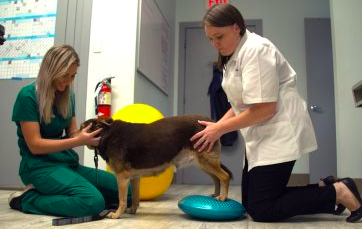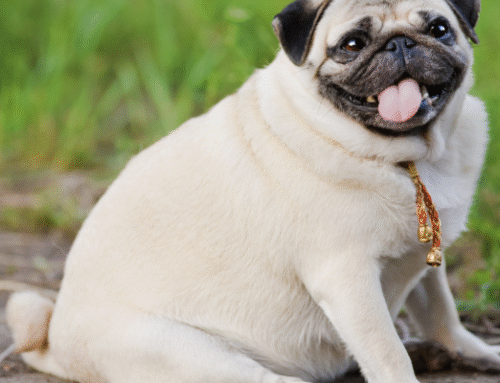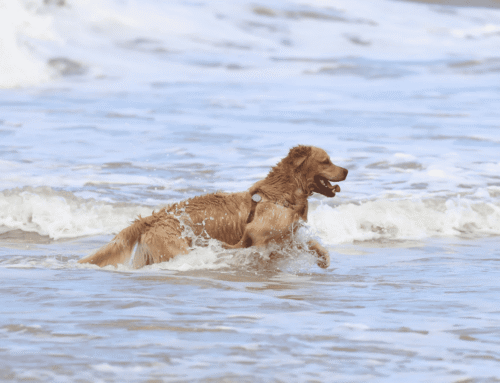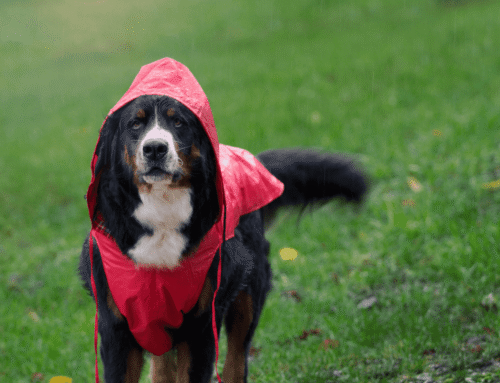Veterinary physical rehabilitation (i.e., physical therapy for pets) is most frequently associated with injured or recovering pets, but this exciting service can benefit every pet—including yours.
Here’s a closer look at how veterinary rehabilitation at Mount Pleasant Animal Hospital can enhance every pet’s life, no matter their age, ability, or health.
Post-operative pets
Many pet owners are familiar with rehabilitation post-surgery because of personal experience. Physical therapy is considered the ultimate standard of care following most human orthopedic surgeries to restore appropriate range of motion, reduce pain, and accelerate healing. The same is true for pets. Veterinary rehabilitation is incredibly advantageous for pets recovering from various hard and soft tissue surgeries, including:
- Cruciate ligament repair (e.g., tibial plateau leveling osteotomy [TPLO], lateral suture, or extracapsular repair)
- Patellar luxation correction
- Fracture repair
- Ligament or tendon rupture
- Total hip replacement
- Limb amputation
Injured and recovering pets
Although mobility-based therapies, such as hydrotherapy (i.e., underwater treadmill) and balance exercises garner the most attention, veterinary physical rehabilitation cares for the entire pet—including injuries of all shapes and sizes.
Our team uses various equipment and techniques, including treadmill walking, photobiomodulation (i.e., laser therapy), acupuncture, therapeutic ultrasound, and targeted exercises, to achieve functional patient goals, such as:
- Pain management
- Inflammation reduction
- Enhanced circulation
- Accelerated healing
- Tissue mobilization
- Increased strength, balance, and coordination
Veterinary physical rehabilitation can be an asset to your pet’s recovery from injuries and conditions, such as:
- Tendonitis
- Iliopsoas injury (i.e., groin strain)
- Muscle strain or stiffness
- Unexplained lameness
- Soft tissue conditions, including burns and wounds
Chronic condition pets
Arthritis, intervertebral disc disease (IVDD), and other chronically painful or inflammatory conditions can limit your pet’s quality of life, but regular veterinary rehabilitation sessions can ease their discomfort, using low impact exercise to build strength, increase joint flexibility, and restore their mobility.
This category also includes pets with conditions where surgery could be undesirable or unsafe, such as:
- Pets unable to undergo anesthesia
- Pets in hospice care
- Young pets
- Pets with early stage injury or disease (e.g., hip dysplasia, grade I or II patellar luxation)
- Pets being conservatively managed (i.e., to control pain and discomfort without surgery)
For many pets, dedicated rehabilitation that includes targeted strengthening can successfully delay or eliminate the need for surgical correction. If surgery is ultimately pursued, “pre-hab” (i.e., rehabilitation prior to surgery), which provides increased strength and mobility, can accelerate the recovery process.
Senior pets
Age-related changes, such as arthritis, sensory loss, and chronic health conditions, limit your senior pet’s quality of life, but rehabilitation can support them through unavoidable changes, slow mobility decline, preserve muscle mass, prevent undesirable weight gain, and restore self-confidence by teaching new movement patterns.
In addition to pain relieving therapies, senior pets enjoy the physical and mental stimulation that rehabilitation therapies provide. Many pet owners believe veterinary physical rehabilitation gave their senior pet renewed energy and a zest for life.
Overweight pets
Overweight pets are at increased risk for countless chronic health issues and a shortened life. One study found that an overweight dog had a shorter lifespan of 2 ½ years than their healthy weight counterparts. Unfortunately, pet weight loss can be challenging and frustrating for pets and owners.
Veterinary physical rehabilitation at Mount Pleasant Animal Hospital is an effective, enjoyable way to reach your pet’s weight loss goals and restore their health and happiness. Our veterinary team will use your pet’s health, age, diet, and lifestyle, along with our rehabilitation modalities and techniques, to design a customized, safe, and achievable weight loss plan. Most plans have a multi-step approach that includes:
- Regular low-impact workouts
- Pain management
- Nutritional counseling and guidance
- Scheduled weigh-ins and reassessments to track—and celebrate—your pet’s progress
Athletic and working dogs
For dogs who are more than companions, veterinary physical rehabilitation can provide enhanced strength training and reduced injury risk, and help them achieve peak performance.
Athletic conditioning with rehabilitation therapies can increase cardiovascular stamina, minimize recovery times, increase speed, power, and coordination, and prevent injuries. Our team is well-versed in most professional and recreational canine physical activities and can provide targeted training and cross-training that suits your dog’s individual performance needs. Regular physical assessments identify and address any physical weaknesses, imbalances, or compensations that could predispose the pet to injury.
Our conditioning patients come from all walks of life and include weekend warriors and full-time professional working canines. Some specialties include:
- Hunting
- Detection work
- Livestock guarding or herding
- Support dogs
- Protection work
- Agility
- Disc dog
- Dock diving
- Obedience and rally obedience
- Lure coursing
Warm-ups and cool downs are critical for injury prevention, and our team can design a customized routine for when you and your dog are on the road or at home.
Veterinary physical rehabilitation is the perfect fit “fur” every pet
Whether your pet is young or old, weak or strong, injured or healthy, an athlete or a couch potato, they can benefit from rehabilitation at Mount Pleasant Animal Hospital. Our team—led by rehabilitation-certified Dr. Marian Shuler Holladay, DVM, CCRP, CVA—will get to know your pet, their condition, and their lifestyle, and help you set and achieve realistic goals for their comfort, mobility, and performance.
To learn more about how veterinary physical rehabilitation can help your pet, contact our team to schedule a rehabilitation consultation. For other veterinary care services, contact Mount Pleasant Animal Hospital or another Animal Hospitals of the Low Country location.








